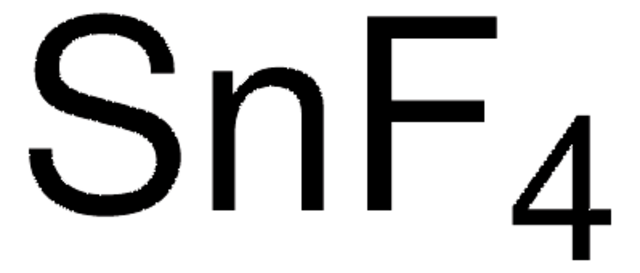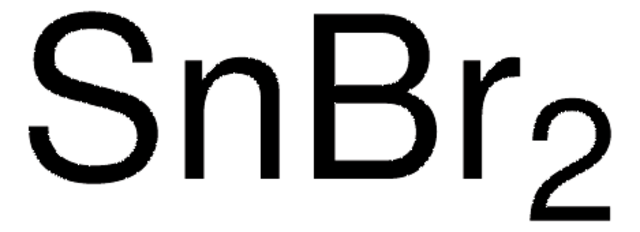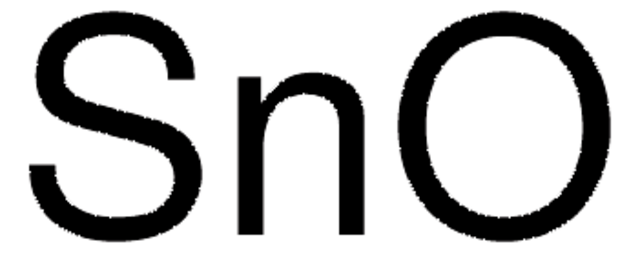334626
Tin(II) fluoride
99%
Synonym(s):
Difluorostannylene, Stannous fluoride, Tin bifluoride, Tin difluoride
About This Item
Recommended Products
Assay
99%
reaction suitability
core: tin
reagent type: catalyst
density
4.57 g/mL at 25 °C (lit.)
SMILES string
F[SnH2]F
InChI
1S/2FH.Sn/h2*1H;/q;;+2/p-2
InChI key
ANOBYBYXJXCGBS-UHFFFAOYSA-L
Looking for similar products? Visit Product Comparison Guide
Application
- As an inhibitor of Sn4+ in fabrication of formamidinium tin iodide (FASnI3) perovskite solar cells (PSCs) via SnF2–pyrazine complex formation.
- As a catalyst in glycerol ketalization, Knoevenagel condensation and aldol-type reactions.
- In the synthesis of α, β-epoxy ketone from α, α-dibromoacetophenone and aliphatic and aromatic aldehyde via oxidative addition of carbon-halogen bonds.
- In the stereocontrolled [3 + 3] , [3 + 4], [3 + 5] annulations reactions.
Signal Word
Danger
Hazard Statements
Precautionary Statements
Hazard Classifications
Acute Tox. 3 Oral - Aquatic Chronic 2 - Eye Dam. 1 - Met. Corr. 1 - Skin Irrit. 2
Storage Class Code
6.1D - Non-combustible acute toxic Cat.3 / toxic hazardous materials or hazardous materials causing chronic effects
WGK
WGK 3
Flash Point(F)
Not applicable
Flash Point(C)
Not applicable
Personal Protective Equipment
Certificates of Analysis (COA)
Search for Certificates of Analysis (COA) by entering the products Lot/Batch Number. Lot and Batch Numbers can be found on a product’s label following the words ‘Lot’ or ‘Batch’.
Already Own This Product?
Find documentation for the products that you have recently purchased in the Document Library.
Customers Also Viewed
Articles
Knoevenagel Condensation is an organic reaction named after Emil Knoevenagel. It is a classic C-C bond formation reaction and a modification of the Aldol Condensation.
Knoevenagel Condensation is an organic reaction named after Emil Knoevenagel. It is a classic C-C bond formation reaction and a modification of the Aldol Condensation.
Knoevenagel Condensation is an organic reaction named after Emil Knoevenagel. It is a classic C-C bond formation reaction and a modification of the Aldol Condensation.
Knoevenagel Condensation is an organic reaction named after Emil Knoevenagel. It is a classic C-C bond formation reaction and a modification of the Aldol Condensation.
Our team of scientists has experience in all areas of research including Life Science, Material Science, Chemical Synthesis, Chromatography, Analytical and many others.
Contact Technical Service













